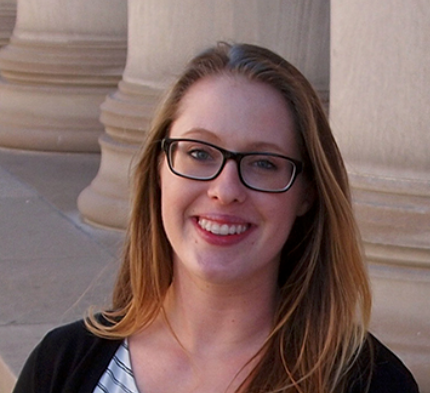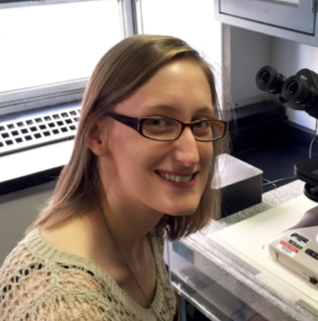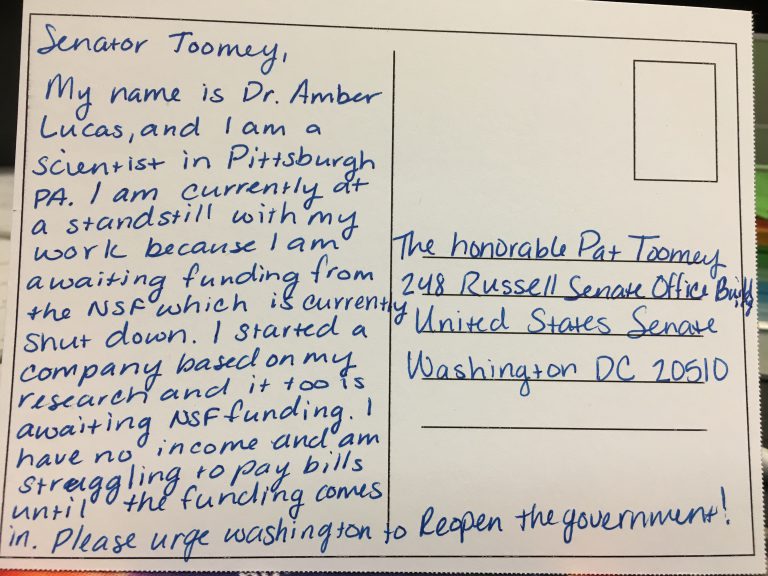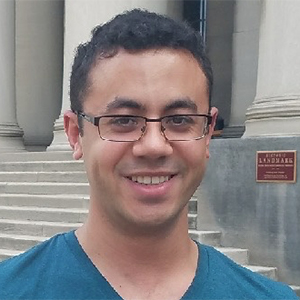The shutdown, a startup, stories and stamps
Most students graduating with Ph.D.s in the life sciences and planning to work in industry probably don’t pay a whole lot of attention to how U.S. lawmakers’ budget negotiations are going. But many found out the hard way during the recent government shutdown that, indeed, their work and livelihoods can be put in jeopardy when Congress and the president are at an impasse.
 Amber Lucas
Amber Lucas
Amber Lucas was one of the young scientists affected. Lucas was wrapping up her Ph.D. at Carnegie Mellon University in Pittsburgh when federal budget negotiations broke down in late December. After her Jan. 7 graduation, Lucas planned to work full time for Impact Proteomics, the startup that she co-founded last year with her doctoral adviser, Jonathan Minden.
But those plans were put on hold when the shutdown began Dec. 22 after President Donald Trump declared that he would not sign any appropriations bill that did not include funding for construction of a wall on the nation’s southern border.
Almost a quarter of the government was affected by the shutdown, with essential personnel working for free and the rest furloughed. Many federal agencies and units were essentially shuttered, while others were just limping along.
The National Science Foundation was forced to halt all activities, including distribution of grant money, some of which had been slated for Lucas’ startup.
“I’ve been preparing to start this company since I started my Ph.D.,” Lucas said. “My adviser had been thinking about this project for 12 years. After we received word that we had been awarded the NSF grant, we made all of our plans around it. Everything was at stake.”
Sharing stories
I’m an alumnus of the Advocacy Training Program by the American Society for Biochemistry and Molecular Biology, and I know that scientists have a strong but often underutilized voice in politics.

As the shutdown continued, I grew increasingly concerned about scientists like Lucas. I wanted to encourage my colleagues to make their legislators aware of stories like hers.
Having learned during the ATP that the one of the best ways to get lawmakers’ attention is to send them hand-written letters, I decided to organize an advocacy event at Carnegie Mellon.
On Jan. 23, I stationed myself in a common space and encouraged faculty and graduate students to take five to 10 minutes to write postcards to their federal lawmakers.
 Stephanie Biedka
Stephanie Biedka
After a couple short hours, eight Ph.D. students and seven faculty members had written a total of 30 postcards to U.S. Sens. Bob Casey, D-Penn., and Pat Toomey, R-Penn., and U.S. Rep. Mike Doyle, D-Penn.
Lucas wrote her story to all three.
So did Stephanie Biedka, a graduate student on track to complete her Ph.D. this month and to become Impact Proteomics’ first official hire.
“It was extremely frustrating,” Biedka says of the shutdown. “My future employer had no money, and I had no idea if I was going to have a job and thought I might have to put my life on hold.”
Lasting effects and lessons
By the time the shutdown ended Jan. 25, almost $140 million in NSF grants had not been awarded. Impact Proteomics was one of many fledgling companies put in limbo.
“It was not a vacation for us,” Lucas said. “Our company has competitors. Now we are behind after postponing travels to meet with potential customers and partners and delaying ordering supplies we need to work.”
Biomedical researchers are well respected across all of Congress, yet many scientists never communicate with their representatives.
One major goal I had for the postcard-writing campaign was to motivate scientists to take action when it comes to policy issues, especially ones that affect the scientific community.
 Amber Lucas’ postcard to Sen. Pat Toomey, R-Penn.
Amber Lucas’ postcard to Sen. Pat Toomey, R-Penn.
Members of ASBMB can use the society’s advocacy toolkit to mobilize their own departments and stand up for what scientists need.
As the campaign I organized demonstrated, all it takes is stories and stamps.
Enjoy reading ASBMB Today?
Become a member to receive the print edition four times a year and the digital edition monthly.
Learn moreGet the latest from ASBMB Today
Enter your email address, and we’ll send you a weekly email with recent articles, interviews and more.
Latest in Policy
Policy highlights or most popular articles

Women’s health cannot leave rare diseases behind
A physician living with lymphangioleiomyomatosis and a basic scientist explain why patient-driven, trial-ready research is essential to turning momentum into meaningful progress.

Building a stronger future for research funding
Hear from Eric Gascho of the Coalition for Health Funding about federal public health investments, the value of collaboration and how scientists can help shape the future of research funding.

Councilors advocate for science on Capitol Hill
ASBMB Councilors meet with their elected officials to advocate for basic scientific research funding and training the next generation of scientists.

Hope for a cure hangs on research
Amid drastic proposed cuts to biomedical research, rare disease families like Hailey Adkisson’s fight for survival and hope. Without funding, science can’t “catch up” to help the patients who need it most.

Supporting science through advocacy and community building
ASBMB calls on scientists to take action as funding cuts and policy shifts threaten the U.S. research enterprise, emphasizing the power of community advocacy and persistence in protecting the future of science.

Seven steps to advocating in your home state
Find out how to schedule, prepare for and conduct a productive district office meeting to communicate the importance of fundamental scientific research funding to your representatives.

